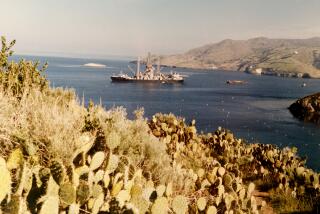THE CRISIS IN THE WHITE HOUSE : THE KEY PLAYERS : Lt. Col. Oliver L. North : <i> A Passion for the Fight Against Communism </i>
- Share via
When an earlier covert mission involving U.S. hostages was being planned--with the ultimate goal of crossing the border from Turkey to Iran to help rescue the American captives there in 1980--the U.S. Marine Corps turned to Oliver L. North.
When a point man was needed to funnel aid secretly to the anti-Sandinista rebels in Nicaragua a few years ago, the White House’s choice was North.
And when someone was needed to visit Tehran quietly earlier this year to accompany a secret shipment of arms for the Iranian military, once again the job went to North.
Now, North is out of a job.
A Marine lieutenant colonel, North was fired from his job as a senior aide on the staff of the National Security Council for allegedly overseeing the transfer of money paid by Iran for anti-tank missiles and anti-aircraft weapons to the contras fighting the Sandinista government in Nicaragua.
Atty. Gen. Edwin Meese III said that North was the only person with complete knowledge of the arrangement, which was kept secret from President Reagan and many other top officials.
The disclosures fell squarely in line with the reputation that North had developed at the White House, where he was known for his unexplained disappearances, 18-hour sessions behind closed doors and tight-lipped devotion to his job.
Whether the job entailed sudden flights to the Central American jungle or the hasty assembling of an invasion force to battle the Marxist government of Grenada, the mission went to Ollie North, a 1968 graduate of the U.S. Naval Academy.
The Texas-born North found himself on a fast track toward the White House after a paper he wrote about battleships while studying at the Naval War College’s command and staff school in 1981 caught the attention of Navy Secretary John F. Lehman Jr. It was the Navy secretary who approved North’s nomination to the National Security Council staff.
Even before his arrival at the White House soon after Ronald Reagan took office, North was no stranger to difficult undercover missions. While participating in counterinsurgency operations in Vietnam, he won two Purple Hearts and a Silver Star for battle deeds in “conventional and unconventional” warfare in Vietnam.
But it was at the White House, where his role as a mid-level bureaucrat belied his deep involvement in the Administration’s most crucial foreign policy operations, that his career took a sharp turn.
In the position of deputy director of the National Security Council’s political-military affairs branch, North developed a close friendship with Robert C. McFarlane, a retired Marine lieutenant colonel and former director of the NSC staff who became a key figure in the operation that funneled the arms to Iran.
However, critics and admirers say, North’s career, which is now in shambles, advanced mostly on the sheer strength of his passion for the fight against communism.
That devotion to this mission led him some time ago to reject a Marine Corps offer of a command assignment, a normal route to promotion in the corps. And, as his role in the operation aiding the contras became known, it took a toll on his personal life: Vandals poisoned the family dog, and pickets and threatening telephone calls forced him to move his family from their home in northern Virginia to temporary quarters at a military base.
Befitting a man who has spent most of his military career in undercover operations, few details of his personal life are readily available. Indeed, the Marine Corps has been reluctant in the past to make public the most rudimentary details of his service record. Even his age--given as 43 or 44--is uncertain in the public record.
More to Read
Get the L.A. Times Politics newsletter
Deeply reported insights into legislation, politics and policy from Sacramento, Washington and beyond. In your inbox twice per week.
You may occasionally receive promotional content from the Los Angeles Times.









